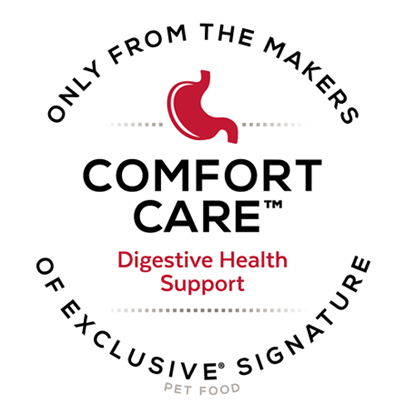PET DIGESTIVE HEALTH MONTH
That’s why we created Pet Digestive Health Month. Many pet owners underestimate the importance of good nutrition and healthy digestion so every August, we’re spreading awareness while helping pet owners evaluate and improve their pet’s digestive health.
Why August? It’s a month that’s always bustling with summer activities and outdoor adventures. As pets spend more time outside, in new places and with new people, they’re more likely to eat things that aren’t good for them and face stress that can be hard on their digestive systems.

Only Exclusive® Pet Foods contain the Comfort Care™ Digestive Health System with a proprietary blend of fiber, prebiotics and probiotics. This combination of beet pulp (fiber), chicory root and a proprietary yeast (prebiotics) plus a specified probiotic blend has been studied and shown to help support the pet’s immune system, optimize the microbiome and support the digestive tract.
Learn MoreGreat Danes, German Shepherds, Golden Retrievers and Collies tend to have more digestive sensitivities.
Note: This list is not all-inclusive but addresses the most common concerns.
If the issue persists, consult your veterinarian to determine if there are any underlying health issues. Ask if a stool sample should be brought to the appointment.
Note: This list is not all-inclusive but addresses the most common concerns.
Establishing and maintaining a routine is important for your dog’s digestive health. Consistent exercise helps to maximize digestion and keep food passing through the digestive tract. The ideal amount and type of exercise can vary by breed, lifestyle and age. Read more to determine the right balance for your dog.
Want a box of goodies sent to you and your pooch? Simply fill out the form below for a chance to win!
Hello!
Thank you for entering the 2021 Exclusive Pet Food’s Pet Digestive Health Month sweepstakes! We will randomly select winners the first week of September and will notify winners directly via email. Winners will also be announced on the Exclusive Pet Foods Facebook page.
In the meantime, head over to our website to learn more about Exclusive Pet Foods and Pet Digestive Health Month!
Thank you,
The Exclusive Pet Food team
With In-Person Work Returning, Nearly Two-thirds of Pet Owners Worry About Their Pet’s Stress Levels, Harris Poll Finds
Download